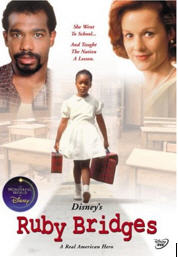
Play Movie on YouTube:
https://www.youtube.com/watch?v=QZgnDbSQ4Io
Play Videos
Play Intro:Ruby Bridges Movie Trailer
Ruby Goes to School:
Trama of Entering School
Movie Scene 10:
Psychiatrist With Ruby
Actual Dr Robert Cole:
Dr Cole Documentary
Ruby Bridges in White House: Ruby Visits Barrack Obama
Stage Play at NEA Conference
The Life and Times of Ruby Bridges:
https://www.youtube.com/watch?v=Ur5iF-qp8-8
The Book for Elementary Children:
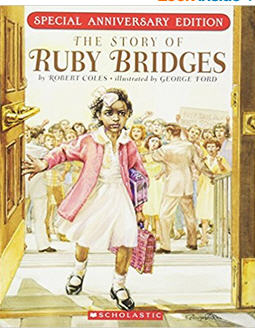
Online Video Reading (7:58):
The Story of Ruby Bridges
https://www.youtube.com/watch?v=U8D4ldGY41s
Alternate Teacher Reading (Pictures only)
https://www.youtube.com/watch?v=Y4F3sr5f-EQ
Buy the DVD from Amazon.com:
Ruby Bridges (90 minutes)
 Ruby Bridges Official Web Site
Ruby Bridges Official Web Site
Other Videos Online:
Civil Rights Ruby Bridegs Video: https://www.youtube.com/watch?v=ecBORXfap9A
Ruby Bridges YouTube Student Presentation:
https://www.youtube.com/watch?v=Xx1zdngX0DQ
Ruby Bridges Comments about Norman Rockwell's Paining:
"The Problem We All Live With"
Ruby Bridges Shares the Key to Overcoming Racism (9:48)
We Are All Going Against The Grain (17:23)
Civil Rights Pioneer on First-Grade Teacher: "She Showed Me Her Heart" (2:08) Oprah
Ruby Bridges: A Marshal's Perspective (13:01)
Ruby Bridges Story (9:01)
The PBS NewsHour A Class of One Ruby Bridges (8:35)
Ruby Bridges at the 2011 National Conference on Volunteering and Service (5:05)
Read the 2000 Article:
The Education of Ruby Bridges
Read the Article: National Women's Museum:
National Women's History Museum Article
New Orleans- The Times-Picayune Word.docx
New Ruby Bridges Statue Inspires Students, Community
Review the Life of Ruby Bridges (wikipedia): https://en.wikipedia.org/wiki/Ruby_Bridges
William Franz Elementary
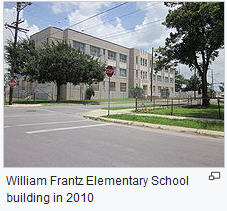
New Life for the School Where
Ruby Bridges Made History
PBS News Hour Interview february 18,1997
A Class of One
Robert Cole Wrote Ruby Story
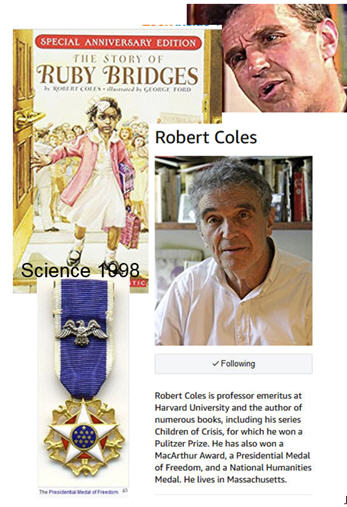 Child psychiatrist Robert Coles volunteered to provide counseling to Bridges during her first year at Frantz.
He met with her weekly in the Bridges home.
Child psychiatrist Robert Coles volunteered to provide counseling to Bridges during her first year at Frantz.
He met with her weekly in the Bridges home.Later, he earned a Pulitzer Prize for General Non-Fiction in 1973 for his series of books Children of Crisis resulting from his first study (Ruby Bridges) and was awarded the Presidental Metal of Freedom in 1998.
Read his bio: Robert Cole on wikipedia.
Presenation Power Point: Ruby Bridges
Ruby Bridges Presenation Page was last modified by John Taylor:

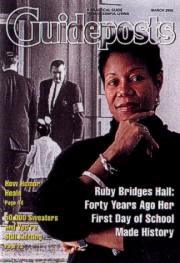
|
In 1998 Disney presented the inspiring true story of one little girl whose strength and dignity during the racially charged 1960s helped change history! When bright six-year-old Ruby Bridges was chosen to be the first African-American student to integrate her local New Orleans elementary school, she is subjected to the true ugliness of racism for the very first time. But guided by the love of her mother and father, Ruby's heroic struggle for a better education is a lesson for us all. Since then, this movie has been an icon of the Civil Rights movement and is shown in both elementary and middle schools, especially during Black History Month. On January 18, 1998 the movie premiered on "The Wonderful World of Disney" as a two hour made for TV movie and was introduced to the nation by Disney President Michael Eisner and the United State President Bill Clinton at the White House. In 1998 America, many millions watched Commercial television mainly either one of three major networks, ABC, CBS, and NBC. Cable TV was just growing in the nation, cell phones were very primitive, and channels like Netflix did not exist. Multimedia and streaming video on the Internet was very limited. Teachers all over the country began showing this film in schools from the DVD after the turn of the century. In an article published in 2000, Ruby started the interview with: "Take another look at the cover of this magazine. The little girl on the left is me in November 1960, walking up the steps of William Frantz Public School in New Orleans, the first black student at the formerly all-white elementary school. That's me now, on the right, married, a mother of four. Forty years separate those pictures. Forty years that brought incredible change in our country, forged in the crucible of the civil rights movement and the battle to end segregation. Forty years that changed me as well." This "Something to Talk About" program will close the 2018 Black History Month Celebration at North Campus. The program will last about 55 minutes with video clips from the movie, actual newsreel video from 1960, and very important interviews of the actual persons involved.
Several Artifacts will be displayed including my framed print of the Normal Rockwell's The program will end with Where is Ruby Bridges today in 2018? Several handouts will be available for the audience |
|

Former U.S. Deputy Marshal Charles Burks later recalled:
|
Early life:Ruby Bridges was born in Tylertown, Mississippi, to Abon and Lucille Bridges. When she was four years old, the family relocated to New Orleans, Louisiana. In 1960, when she was six years old, her parents responded to a request from the National Association for the Advancement of Colored People (NAACP) Integration:In early 1960, Bridges was one of six black children in New Orleans to pass the test that determined whether they could go to the all-white school, William Frantz Elementary. Two of the six decided to stay at their old school, Bridges went to a school by herself, and three children were transferred to McDonogh No. 19 and became known as the McDonogh Three. |
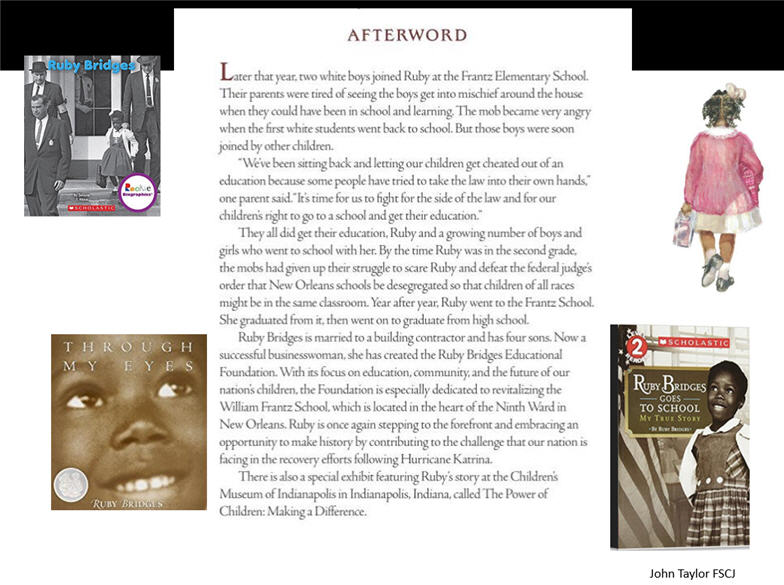
|
|
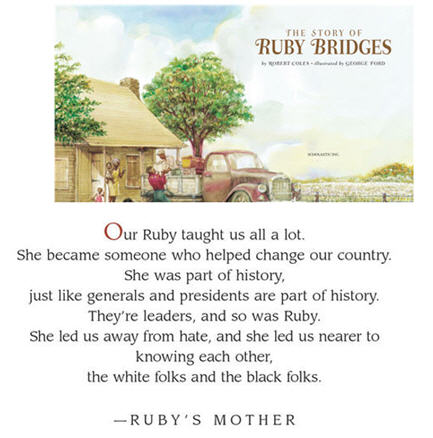 The Bridges family suffered for their decision to send her to William Frantz Elementary: her father lost his job, the grocery store the family shopped at would no longer let them shop there, her mother had to take a job scrubbing floors, and her grandparents, who were sharecroppers in Mississippi, were turned off their land. |
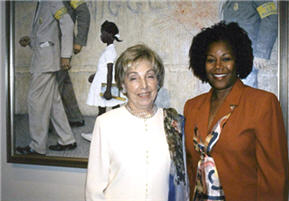
Photo of Ruby Bridges Hall and her former elementary teacher, Barbara Henry, at Norman Rockwell Museum, June 2004. As soon as Ruby entered the school, white parents pulled their own children out; all the teachers refused to teach while a black child was enrolled. Only one person agreed to teach Ruby and that was Barbara Henry, from Boston, Massachusetts, and for over a year Henry taught her alone, "as if she were teaching a whole class." Ruby later said: "And me, I couldn't have gotten through that year without Mrs. Henry. Sitting next to her in our classroom, just the two of us, I was able to forget the world outside. She made school fun. We did everything together. I couldn't go out in the schoolyard for recess, so right in that room we played games and for exercise we did jumping jacks to music." |
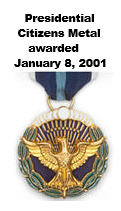
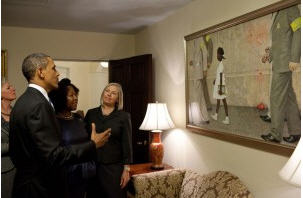
Visit: Norman Rocwell Museum Happy Birthday: Ruby Bridges at White House |
On July 15, 2011, President Barack Obama invited Ms. Bridges Hall and officials from Norman Rockwell Museum
to attend a special meet and greet at the White House, and view Rockwell's original
The Problem We All Live With painting, which had been requested by the President and loaned by the Museum to commemorate the 50th anniversary of Bridges' historic walk.
Standing outside of the Oval Office with Bridges in front of the iconic painting, the President remarked that
"if it hadn't been for you guys, I might not be here and we wouldn't be looking at this together." |
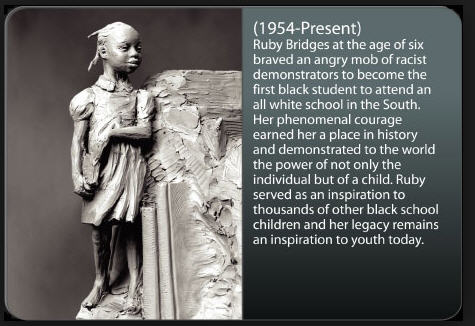
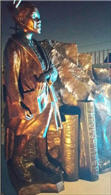
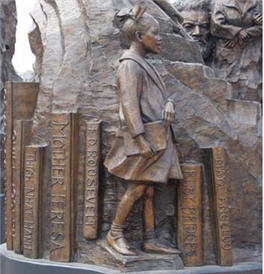
|
|